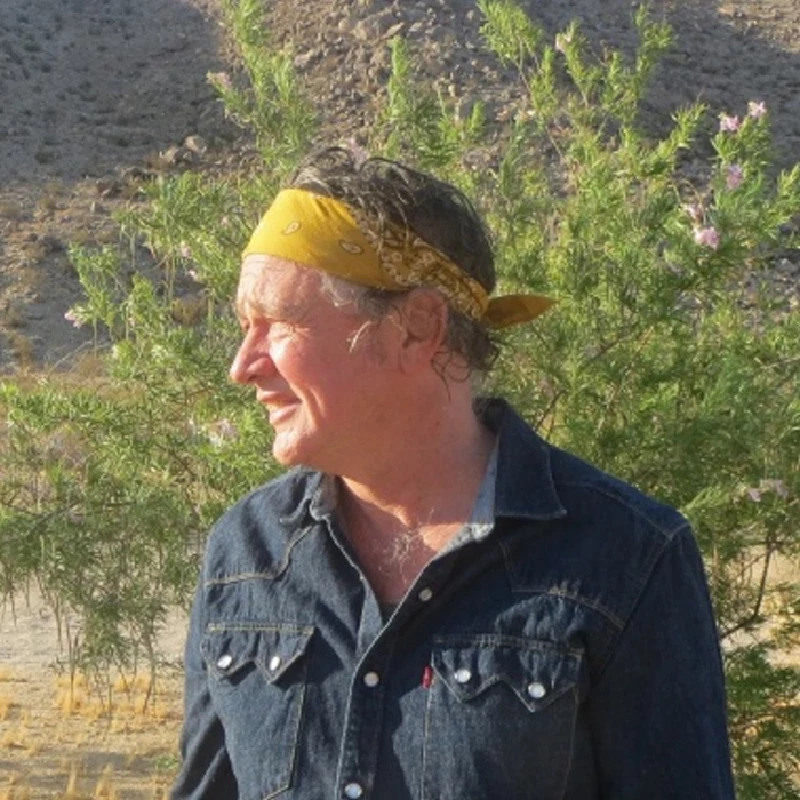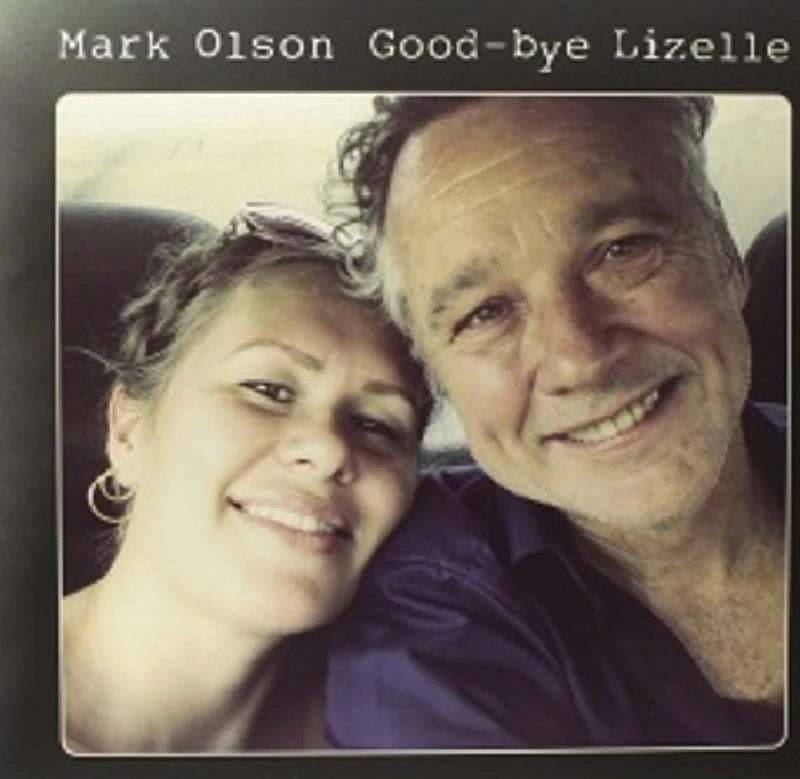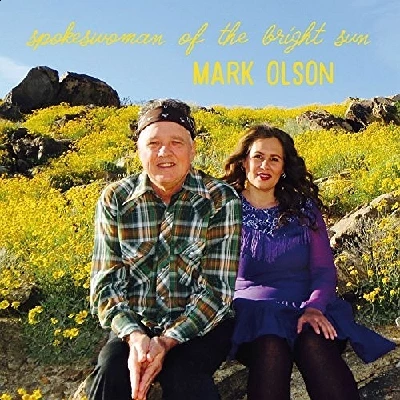Mark Olson - Interview
by Carl Bookstein
published: 14 / 11 / 2014

intro
Carl Bookstein speaks to Mark Olson, the front-man with the Jayhawks about his new solo album, 'Good-bye Lizelle'
Recorded on the road in his travels across continents, Mark Olson has tapped into a unique and poetic vibe with his latest album ‘Good-bye Lizelle’. Olson is best known as founder, singer and songwriter for the seminal, influential alternative country rock band the Jayhawks, which was born in Minneapolis, Minnesota in the mid 1980s. Featuring beautiful harmony vocals, and a folk based Americana approach, the Jayhawks have made rich, soul calming music that is truly enduring. On ‘Good-bye Lizelle’, the listener hears a new and altogether different, internationally inspired sound, with thoughtful and poetic lyrics that speak to love and dreams. The album was made over travels from Armenia to South Africa, USA to Norway and Finland and on to the Czech Republic. Olson travelled with his wife Ingunn Ringvold, the Norwegian singer who lends vocal and songwriting assistance on the new album. ‘Good-bye Lizelle’ captures imagery from the soul of the desert into clouds like rivers falling. It is a memorable turn from a thoughtful singer and songwriter. Mark Olson kindly took the time to speak with Pennyblackmusic. PB: Before the Jayhawks 2011 album‚ 'Mockingbird Time‘, you had had a fifteen year hiatus from that band. Is the new solo album a hiatus album for you from the Jayhawks or possibly something of a more permanent break? MO: I remember running in a race, at 600 yards a little over once around the track race. On this spring day and on the way to the track there was a grain silo that had burst into flames. My entire being, history, future and outlook was based in Minnesota. I ran for joy, I ran because I thought I was taking part in the American prairie version of the marathon. There was some deep and important message hidden inside my clenched hands that I had to deliver. I was not going to open my hands until I had arrived at the right gate. Burning in the background was the last year’s corn of my dairy farmer relatives, in front of me my teacher kin, my wonderful grandmothers, my aunt with the banjo in Beresford, South Dakota, my uncle’s poems glowing in Iowa, the swamp thicket, the red wing blackbird fence line, the never ever going inside the house in the summer. When the race started I took off. I flew around the track. I was dancing in Pipestone, I was dancing on the morning green grass when the sun just comes up. As soon as I had won the race, a large competitor came and pushed me down. I started to chant back at him. “I flew, I flew around the track” Many people came and broke up this sad spectacle. It was better that they stepped in and broke it up. PB: In addition to your work with the Jayhawks and the Original Harmony Ridge Creek Dippers, you have put out solo albums before. What prompted the decision to make a solo album at this time? MO: I write music and poems and play various instruments. This is what I do. It is hard to explain that where I live, so I quit trying. I have toured every year on all of my various albums. I enjoy touring very much. I like the movement and the people, and on my own I have operated outside of the general music business schematic, and this has had a great effect on my music because I play for audiences quite unfamiliar with my work. I have to arrange the songs, tempos and instrumentation in order to reach out and hold new audiences. Good miking on the djembe drum is a real key to this operation. Most of the drumming on the album is the djembe. The djembe has more tonal range than a drum kit, and means thousands of dollars saved verses the large unruly drum kit in transportation costs for aspiring touring musicians. Back to the question: I have hope in the melodic, poetic message of music and how it can communicate various ideas and unspoken truths across time and distance: that is why I make new albums PB: This new album was recorded while you were extensively traveling abroad. Can you speak to how any certain countries inspired your music the most? MO: Just so people understand we waited for 29 months for Ingunn to get a Visa to come to America. During this period we spent time in Armenia. We went there with the Paros Foundation. They help with various projects, in different towns in Armenia. We visited an Armenian music school in the Lori region. The teachers and people of Vanadzor Armenia made us feel very welcome. The depth and strength of Armenian music was an eye opener for both of us. The music is very broad, very deep and very historical, its roots are everywhere in Western and Eastern music. Begin with Sayat Nova and Komitas. You will have years of great understanding in your soul listening to these two masters of melody, lyrics and sound. PB: What was the recording process of the new album like and how would you record as you travelled? MO: I record with a Nagra. I carry it on my shoulder. Yes, I realise in some sense the world is competitive, and that I am in the same bracket as musicians that avail themselves of multi-million dollar recording studios and pro tool tweaking instrument and vocal sessions. We play each track in its entirety, all vocals are complete takes. We mixed in the Czech Republic on a board to make it sound more outstanding with some spring reverb. The building of tracks on the Nagra requires bouncing to another field recording device. This places us around 1964 in the level of technical savvy I am applying to the tape. I am moving the microphone looking for the best outdoor sound. I am not using close miking, compression modern sound guidance values. I enjoy searching for a unique sound that gives field recording a more atmospheric poetic vibe. PB: When the single ‘Blue’ hit the radio in 1995 from the Jayhawks album ‘Tomorrow the Green Grass’, it knocked me out. Were you at all taken by surprise with its success? MO: We just made an incredible video of this exact song on our front porch yesterday! Here it is! https://www.facebook.com/video.php?v=10153131772798835&set=vb.7308748834&type=2&theater PB: What was the initial inspiration for the Jayhawks’ alternative country rock muse? Were there certain big influences that you and the band were into? MO: Punk rock. All the bars were filled with punk bands. I liked folk music, I liked the sound and feel of the acoustic guitar so I went with that idea. My aunt had Buffy St, Marie, Bob Dylan, Bert Jansch and Lucky 13 on in her apartment. Just basically going with what you know and understanding how to do it. PB: Do you find the songwriter process rewarding at this point in your journey? As much so when writing with Ingunn Ringvold? MO: Ingunn and I work together very well. I can gage her sense of an idea by the way she holds herself and breathes. With all the harmonies on the album we took the never actually work on the part approach. Because we are married she hears me messing on the guitar with something ,and over time the harmony parts will present themselves to both of us naturally without formal engagement in the try this, try that rigmarole. Also on the album there was not any instrument or vocal part choices to make during mixing. The 8 tracks were there. This is the knowledge and osmosis method. Over time things will present themselves in the right order. This also brings up something I learned in the desert while I was working on houses. I was just doing the running, pulling nails and clean up work. The guy in charge of the operation worked in his bare feet on the hot desert sand and always was pointing things out to me. “Man, look at that there. Do you see that there?” His point was whatever happened and that you could observe had a very logical reason and description for happening and the desert being so light heavy, stark and empty made it easier to discern these facts. He would say, “Animals will lay down next to what killed them.” PB: In addition to poetic, these new songs seem to possess a mystical quality. Do you see yourself as a spiritual person? MO: I had two people in my family that had great courage, way above the average sense of the word, and that has kept me on course with a sense of a purpose. Your question requires self reflection! I am way more of a doer than a person given to spiritualism. PB: There seem to be reoccurring themes of love and dreams on the new album. Do you see and can you speak to these as themes? MO: I can have my front and back door open in the evening and the wind blowing through the house. Now on YouTube there are all the Kathleen Ferrier songs. I have the speakers I bought to make ‘Good-bye Lizelle‘, and I run the line from the computer and on comes this voice, I have to get up and walk around the floor, I have to stare out the backdoor and the front door. I have to see if it is real. I see my father standing on the edge of a wrestling mat at an empty Williams Arena facing for the third time his opponent in the state title match. Both of them all three years had to have perfect records to arrive at this match again: zero losses no matter how they felt against farm boys who lifted hay bales in the sun everyday of their summer lives. My father lost both of those previous matches in his sophomore and junior years. This was the third and final match. His opponent was blind, and had a seeing eye dog on the edge of the mat that kept up a low discernible growl throughout the entire contest. This was allowed back then. There was nobody there in the semi-darkened arena except my grandmother who told me about it. It was brutal, it was a blood match. It was the strength of nations distilled in two motivated young men. My father pinned him in the end, there wasn`t anything left of either of them. They both had to be helped up. Love and dreams are this wrestling match. It is what happens inside your mind and soul when you are put up against complete, total and unyielding mental and physical stress. PB: Do you plan to play these new songs live in the near future? MO: Yes! We rehearse them everyday. These are the songs of a lifetime. PB: Thank you.
Band Links:-
http://markolsonmusic.com/https://www.facebook.com/jayhawksofficial/timeline?ref=page_internal
https://twitter.com/markolsonmusic
https://www.facebook.com/markolsonmusic


soundcloud
reviews |
|
Spokeswoman of the Bright Sun (2017) |

|
| Former Jayhawks member Mark Olson returns from his Joshua Tree home with an excellent batch of new songs written with his wife Ingunn Ringvold. |
| Goodbye Lizelle (2014) |
most viewed articles
current edition
John McKay - InterviewRobert Forster - Interview
Cathode Ray - Interview
Spear Of Destiny - Interview
Fiona Hutchings - Interview
When Rivers Meet - Waterfront, Norwich, 29/5/2025
Carl Ewens - David Bowie 1964 to 1982 On Track: Every Album, Every Song
Chris Wade - Interview
Brian Wilson - Ten Songs That Made Me Love...
Shrag - Huw Stephens Session 08.12.10 and Marc Riley Session 21.03.12
previous editions
Heavenly - P.U.N.K. Girl EPBoomtown Rats - Ten Songs That Made Me Love....
Allan Clarke - Interview
Oasis - Oasis, Earl's Court, London, 1995
Manic Street Preachers - (Gig of a Lifetime) Millennium Stadium, Cardiff, December 1999
Barrie Barlow - Interview
Pixies - Ten Songs That Made Me Love...
Beautiful South - Ten Songs That Made Me Love...
Trudie Myerscough-Harris - Interview
Dwina Gibb - Interview
most viewed reviews
current edition
Peter Doolan - I Am a Tree Rooted to the Spot and a Snake Moves Around Me,in a CircleGarbage - Let All That We Imagine Be The Light
Vinny Peculiar - Things Too Long Left Unsaid
Vultures - Liz Kershaw Session 16.06.88
John McKay - Sixes and #Sevens
Little Simz - Lotus
HAIM - I Quit
Morcheeba - Escape The Chaos
Pulp - More
Lapsley - I'm a Hurricane, I'm a Woman In Love
Pennyblackmusic Regular Contributors
Adrian Janes
Amanda J. Window
Andrew Twambley
Anthony Dhanendran
Benjamin Howarth
Cila Warncke
Daniel Cressey
Darren Aston
Dastardly
Dave Goodwin
Denzil Watson
Dominic B. Simpson
Eoghan Lyng
Fiona Hutchings
Harry Sherriff
Helen Tipping
Jamie Rowland
John Clarkson
Julie Cruickshank
Kimberly Bright
Lisa Torem
Maarten Schiethart